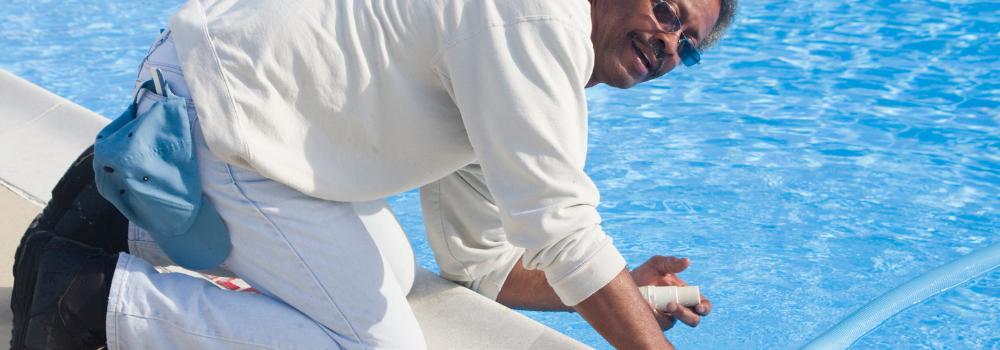Alkalinity is among the core and crucial elements of the water chemistry of a pool. More commonly referred to as ‘Total Alkalinity’ – it helps maintain the water balance by controlling the pH.
Use this short guide to learn how to test alkalinity in a pool and raise or lower it when needed.
Why is it important to test for alkalinity in a pool?
Although total alkalinity and pH are two different things, they are closely related. Optimal alkalinity in your pool regulates the pH levels of the water.
A too-high or too-low pH can make the water overly basic or acidic.
Low levels of alkalinity in water can result in staining of the tiles, corrosion of metal components, and sanitizer (Chlorine) inefficiency.
Too high alkalinity can cause cloudy pool water, scaling of surfaces and equipment, clogged circulation system, and itching of eyes and skin.
The ideal pH level of pool water should be mildly alkaline (between 7.2 and 7.8) since it is where the sanitizer (Chlorine or Bromine) works best.
The pH of pool water is sensitive and easily influenced by factors such as changes in temperature and the introduction of foreign elements. The total alkalinity acts like a buffer to absorb the effects of such inevitable factors and maintain the optimal pH levels of the pool water.
How to test for alkalinity in your pool
Testing the pool water for alkalinity is simple and can be done independently. You need a test kit that can test for alkalinity and some time to test it. Be aware that the optimal alkalinity is between 80-120 ppm, and 100 ppm is the ideal level.
You can buy a test kit at your local pool shop or order some online. But be sure that you buy one that can test for alkalinity.
Most of the time, the test kits measure a variety of chemicals at the same time.
There are two options for this when you do it on your own:
- The pool test strip
- The liquid pool test kit
Between these two, the pool test strip is the easiest to use. We wrote in-depth articles on pool test strips and liquid pool test kits. So when you want to use any of these, just read and check out our article.
In case you don’t want to do it yourself, there are other options as well.
The first one is using a pool monitoring system like Sutro. It will measure the alkalinity once everyday and notify you when it reaches a critical range.
It also tests pH and chlorine three times a day to keep a close eye on water balance. On top of that, it also tells you what chemicals you need to add when the pool water reaches a critical range.
The next one is straightforward but requires a visit to the local pool shop. You can take a sample (8 ounces) of your pool water and ask the pool shop to test it.
The last one is the simplest; you hire a pool service company for a test or even a monthly service.
How to raise alkalinity in your pool
The addition of rainwater (acid rain), the release of bodily fluids (sweat or urine), and adding too much acid to the water decrease the alkalinity.
As a cheaper and readily available chemical, the solution is adding an alkalinity-increasing chemical to your pool, like sodium bicarbonate (baking soda). Please refer to our detailed guide on how to raise alkalinity in your pool for exact steps and measurements.

How to lower alkalinity in your pool
High alkalinity (above 120 ppm) in a pool can result from using too much baking soda (when raising alkalinity), filling the pool with an alkaline water source, or sometimes from chlorine-based shock tablets.
The best chemicals to lower pool alkalinity are muriatic acid and sodium bisulfate (dry acid). Please take a look at our guide on how to lower alkalinity in your pool for detailed information.
Conclusion
Sudden changes in the pH levels of pool water can result in imbalanced water chemistry. The alkalinity of your pool water is what keeps it from changing rapidly. You’ll need to check the alkalinity levels at least once a week to raise or lower them when needed.

